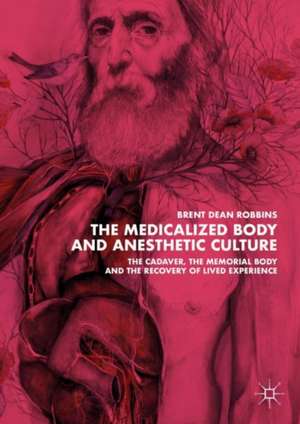The Medicalized Body and Anesthetic Culture: The Cadaver, the Memorial Body, and the Recovery of Lived Experience
Autor Brent Dean Robbinsen Limba Engleză Hardback – 4 apr 2018
This book examines how modern medicine’s mechanistic conception of the body has become a defense mechanism to cope with death anxiety. Robbins draws from research on the phenomenology of the body, the history of cadaver dissection, and empirical research in terror management theory to highlight how medical culture operates as an agent which promotes anesthetic consciousness as a habit of perception. In short, modern medicine’s comportment toward the cadaver promotes the suppression of the memory of the person who donated their body. This suppression of the memorial body comes at the price of concealing the lived, experiential body of patients in medical practice. Robbins argues that this style of coping has influenced Western culture and has helped to foster maladaptive patterns of perception associated with experiential avoidance, diminished empathy, death denial, and the dysregulation of emotion.
| Toate formatele și edițiile | Preț | Express |
|---|---|---|
| Paperback (1) | 1109.71 lei 6-8 săpt. | |
| Palgrave Macmillan US – 10 dec 2019 | 1109.71 lei 6-8 săpt. | |
| Hardback (1) | 1118.87 lei 6-8 săpt. | |
| Palgrave Macmillan US – 4 apr 2018 | 1118.87 lei 6-8 săpt. |
Preț: 1118.87 lei
Preț vechi: 1364.48 lei
-18% Nou
Puncte Express: 1678
Preț estimativ în valută:
214.10€ • 228.94$ • 178.51£
214.10€ • 228.94$ • 178.51£
Carte tipărită la comandă
Livrare economică 17 aprilie-01 mai
Preluare comenzi: 021 569.72.76
Specificații
ISBN-13: 9781349953554
ISBN-10: 1349953555
Pagini: 446
Ilustrații: XIII, 345 p. 6 illus. in color.
Dimensiuni: 148 x 210 mm
Greutate: 0.73 kg
Ediția:1st ed. 2018
Editura: Palgrave Macmillan US
Colecția Palgrave Macmillan
Locul publicării:New York, United States
ISBN-10: 1349953555
Pagini: 446
Ilustrații: XIII, 345 p. 6 illus. in color.
Dimensiuni: 148 x 210 mm
Greutate: 0.73 kg
Ediția:1st ed. 2018
Editura: Palgrave Macmillan US
Colecția Palgrave Macmillan
Locul publicării:New York, United States
Cuprins
1. The Medicalized Body and Anesthetic Culture
2. Confronting the Cadaver: The Denial of Death in Modern Medicine
3. Time and Efficiency in the Age of Calculative Rationality: A Metabletic Entry Point
4. The Zombie Body of Linear Perspective Vision
5. Applications of Terror Management Theory
6. Terror Management in Medical Culture
7. Dehumanization in Modern Medicine and Science
8. Objectification of the Body as a Terror Management Defense
9. The Objectification of Women and Nature
10. The Role of the Medical Cadaver in the Genesis of Enlightenment-Era Science and Technology
11. A Theological Context
12. The Changing Nature of the Cadaver
13. Anesthetic Culture
14. Psychiatry’s Collusion with Anesthetic Culture
15. Mindfulness—the Way of the Heart
2. Confronting the Cadaver: The Denial of Death in Modern Medicine
3. Time and Efficiency in the Age of Calculative Rationality: A Metabletic Entry Point
4. The Zombie Body of Linear Perspective Vision
5. Applications of Terror Management Theory
6. Terror Management in Medical Culture
7. Dehumanization in Modern Medicine and Science
8. Objectification of the Body as a Terror Management Defense
9. The Objectification of Women and Nature
10. The Role of the Medical Cadaver in the Genesis of Enlightenment-Era Science and Technology
11. A Theological Context
12. The Changing Nature of the Cadaver
13. Anesthetic Culture
14. Psychiatry’s Collusion with Anesthetic Culture
15. Mindfulness—the Way of the Heart
Notă biografică
Brent Dean Robbins is Chair and Associate Professor of Psychology at Point Park University in Pittsburgh, PA, USA. He is former President of the Society for Humanistic Psychology, Division 32 of the American Psychological Association.
Textul de pe ultima copertă
This book examines how modern medicine’s mechanistic conception of the body has become a defense mechanism to cope with death anxiety. Robbins draws from research on the phenomenology of the body, the history of cadaver dissection, and empirical research in terror management theory to highlight how medical culture operates as an agent which promotes anesthetic consciousness as a habit of perception. In short, modern medicine’s comportment toward the cadaver promotes the suppression of the memory of the person who donated their body. This suppression of the memorial body comes at the price of concealing the lived, experiential body of patients in medical practice. Robbins argues that this style of coping has influenced Western culture and has helped to foster maladaptive patterns of perception associated with experiential avoidance, diminished empathy, death denial, and the dysregulation of emotion.
Caracteristici
Uses findings across fields of psychology and philosophy, representing a new wave of thinking called the "experiential revolution”
Integrates a wide variety of perspectives from across theoretical orientations and sub-fields of psychology
Synthesizes psychology existential and phenomenological philosophy, especially Martin Heidegger and Maurice Merleau-Ponty
Integrates a wide variety of perspectives from across theoretical orientations and sub-fields of psychology
Synthesizes psychology existential and phenomenological philosophy, especially Martin Heidegger and Maurice Merleau-Ponty
